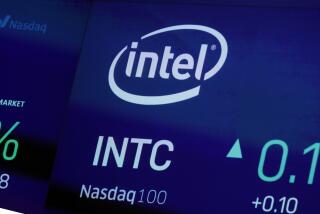Japanese Antitrust Officials Raid Intel
- Share via
Japan’s Fair Trade Commission on Thursday raided the Tokyo offices of Intel Corp. as part of an investigation into whether the California semiconductor giant pressured personal-computer makers into using its microprocessors at the exclusion of rivals’ chips.
Intel, headquartered in Santa Clara, Calif., has faced similar probes into its business practices elsewhere, including in Europe, where antitrust regulators still have an inquiry open.
Japan’s fair trade authorities suspect that Intel improperly urged clients not to include processors manufactured by Advanced Micro Devices Inc., based in Sunnyvale, Calif., and other companies, said Masaru Matsuo, a manager at the Fair Trade Commission.
Intel said it was cooperating.
“We don’t have a clear indication from them about what this is about,” said Chuck Mulloy, an Intel spokesman. “Per our normal practice, we’re trying our best to cooperate with them and trying to learn more about what this is.”
Matsuo declined to specify what exactly investigators were after. Intel does provide marketing money to PC makers that use Intel chips and also brand their products with “Intel Inside” and “Centrino” labels. Centrino is Intel’s wireless networking set of chips.
Such programs are not illegal, though attempts by a dominant company to use financial and other incentives to lock out rivals would violate antitrust laws.
“Branding programs don’t violate laws. It’s when you use finances to exclude competitors and lock in channels ... that’s the problem,” said AMD spokesman Dave Kroll.
AMD, Intel’s chief rival in the microprocessor business, declined to say whether it had complained to the Japanese agency but did confirm that investigators had asked it questions. AMD had complained in October 2000 to the European Commission about Intel’s alleged monopolistic abuse.
Intel microprocessors power about 80% of personal computers worldwide. About 85% of all PCs shipped in Japan were embedded with Intel chips in the last quarter of 2003, according to IDC, a high-technology market analysis company.






